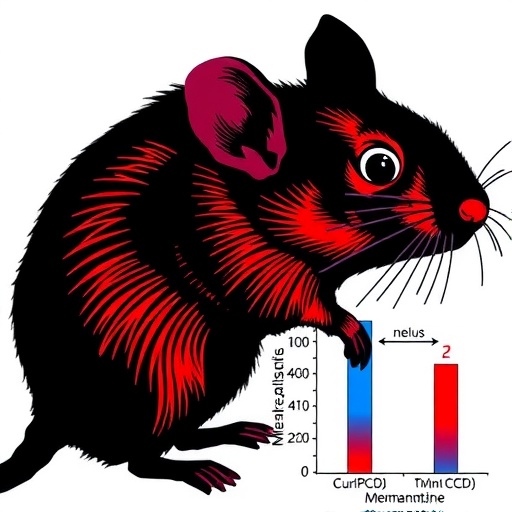In the intricate world of neuroscience, the effects of addictive substances on cognitive functions are a matter of paramount concern. A recent study conducted by Khodamoradi, Allameh, Sarani, and their colleagues adds a significant contribution to this rapidly evolving field. This groundbreaking research delves into the effects of methamphetamine—a potent stimulant—on social and recognition memory, particularly in rat models. The authors of the study have proposed that memantine, a medication primarily used to treat Alzheimer’s disease, could potentially mitigate the profound cognitive repercussions engendered by methamphetamine use.
Methamphetamine is notorious for its capacity to induce severe psychological and physiological changes, leading to considerable impairments in cognitive functions. Previous research has established that prolonged exposure to methamphetamine can lead to deficits in memory, decision-making, and social interactions. These cognitive impairments not only disturb the standard cognitive processes but also have broader implications on social behaviors, potentially isolating individuals from their communities and impacting their quality of life drastically.
At the heart of this study lies the hypothesis that memantine can protect against these cognitive deficits. Memantine operates as an N-methyl-D-aspartate (NMDA) receptor antagonist, which suggests that it may counteract the neurotoxic effects associated with excessive glutamatergic activity often exacerbated by drugs like methamphetamine. This mechanism gives hope that memantine could act as both a protective agent and a potential therapeutic avenue for those grappling with methamphetamine addiction.
Using rat models, the researchers conducted a series of experiments to assess the neuroprotective effects of memantine post-methamphetamine exposure. By observing the subjects’ social behaviors and memory recognition tasks, they aimed to draw a comprehensive correlation between memantine administration and improved cognitive functions. The complexity of the experimental design underscored the effort to simulate conditions that closely represent the changes observed in humans, thereby lending credence to the findings.
The results from the experiments conducted were promising and demonstrated a significant reduction in methamphetamine-induced impairments. Rats treated with memantine exhibited enhanced social interaction and improved recognition memory compared to their non-treated counterparts. These findings not only validate the initial hypothesis but also illuminate the prospect of repurposing existing drugs for new indications, particularly in the sphere of addiction treatment.
Moreover, the implications of this study extend beyond just the immediate cognitive effects observed. The ability of memantine to restore cognitive functioning could lead to broader social reintegration for individuals recovering from methamphetamine addiction. Effective treatments that foster better cognitive capacities can facilitate improved daily functioning, enhance interpersonal relationships, and ultimately contribute to a more substantial recovery process. This insight underscores the importance of continued research in understanding how existing medications can be utilized in novel ways to combat the rising epidemic of substance abuse.
Despite the encouraging results, the study also prompts further inquiry into the long-term effects and safety of memantine as a therapeutic intervention for substance-related cognitive impairments. While the current findings highlight significant improvements in memory and social behaviors, the potential for adverse side effects or dependency on memantine itself requires meticulous evaluation. Future studies should focus on these aspects, as well as the viability of translating these findings from animal models to human studies.
In a world where substance abuse remains a critical public health issue, research that bridges the gaps between pharmacological interventions and cognitive recovery is invaluable. The work of Khodamoradi and colleagues opens new avenues not merely for treating addiction but also for understanding the underlying neurobiology of memory and social cognition affected by stimulants. It challenges the scientific community to rethink the potential of cognitive enhancers and neuroprotective agents as viable options in addiction therapies.
Moreover, the study ignites discourse around the necessity of integrating neuroscientific research into public health strategies. Knowledge is power, and understanding which existing medications can be beneficial in the realm of addiction treatment empowers both healthcare providers and patients alike. The balance between innovation and patient safety remains delicate, emphasizing the need for a scientifically informed approach to addiction recovery.
As the findings from this study circulate within the scientific community, they may also need to overcome skepticism pertaining to pharmacological therapies for addiction. Traditionally, addiction treatment has been dominated by behavioral therapies, but the demonstrated efficacy of memantine in this context calls for a reevaluation of existing paradigms. Embracing a broader spectrum of treatment modalities may ultimately lead to more successful outcomes for those affected by addiction.
In conclusion, the research highlights the fragile nexus between substance abuse, memory, and social cognition. The findings suggest that cognitive enhancement through existing drugs like memantine could play a pivotal role in ameliorating the damaging effects of methamphetamine. As more research unfolds, the dialogue surrounding addiction treatment will undoubtedly evolve, potentially paving the way for innovative therapeutic strategies that prioritize cognitive recovery and holistic healing.
This exploration of memantine’s protective effects against methamphetamine-induced cognitive deficits speaks to a future where neuroscience and addiction treatment can harmoniously intersect, offering new hope to those in desperate need of alternatives to traditional treatment pathways. The journey towards understanding and treating the intricacies of addiction is ongoing, and studies like this serve as crucial stepping stones on that path.
Subject of Research: Cognitive effects of methamphetamine and the potential neuroprotective role of memantine.
Article Title: Memantine mitigates methamphetamine-induced impairments in social and recognition memories in rats.
Article References:
Khodamoradi, M., Allameh, Y., Sarani, M. et al. Memantine mitigates methamphetamine-induced impairments in social and recognition memories in rats. BMC Neurosci 26, 36 (2025). https://doi.org/10.1186/s12868-025-00955-7
Image Credits: AI Generated
DOI: 10.1186/s12868-025-00955-7
Keywords: Methamphetamine, Memantine, Cognitive Impairment, Memory, Neuroprotection, Addiction Treatment, Social Behavior, Glutamate, NMDA Receptor.
Tags: addiction neuroscience researchAlzheimer’s medication for addiction treatmentcognitive deficits from methamphetaminecognitive function recovery in substance abuseeffects of methamphetamine on memoryglutamatergic activity and neurotoxicityimplications of methamphetamine on social behaviormemantine and methamphetamine interactionneuroprotective effects of memantineNMDA receptor antagonists in addictionrat models in addiction studiessocial memory impairments in rats





